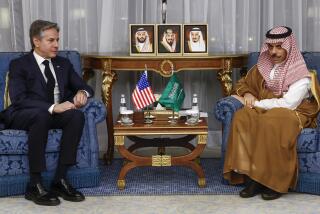Murphy Heads for London to See Hussein, Peres in New U.S. Mideast Peace Bid
- Share via
WASHINGTON — The Reagan Administration’s chief Middle East trouble-shooter, Richard W. Murphy, left for London on Friday for meetings with Jordan’s King Hussein and Israel’s Prime Minister Shimon Peres at the start of another U.S. attempt to get the stalled Arab-Israeli peace process moving again.
By bringing Hussein and Peres to the same city at the same time, Murphy, assistant secretary of state for Near Eastern and South Asian affairs, could be setting the stage for face-to-face talks between them.
Such a meeting might permit Peres and Hussein to work out an agreement on the issues that have stalled the Middle East peace process for months, despite repeated attempts by U.S. intermediaries to narrow the differences.
Little Information Given
The State Department was reluctant to provide any information on Murphy’s trip. Bernard Kalb, the department’s chief spokesman, said Murphy had left Washington but refused to say where he was going or whom he would meet.
Another State Department official, who asked not to be identified by name, said Hussein, who is in London on a private visit, has agreed to meet Murphy. He said he had no information to indicate that Peres would also be in London. However, the Israeli newspaper Haaretz, which is usually well informed about the prime minister’s plans, said Peres will go to London to meet Murphy.
Washington’s hopes for an early Middle East settlement soared last spring when both Hussein and Peres called for peace talks between Israel and a joint Jordanian-Palestinian delegation. But the effort to get negotiations under way foundered on disagreements over Palestinian representation and the nature of the conference.
Five Rejected by Israel
Jordan insisted on the participation of Palestinians nominated by--although not necessarily members of--the Palestine Liberation Organization. Israel rejected five of the seven Palestinians proposed by Hussein, who so far has refused to suggest other names.
In addition, Jordan called for an international conference, attended by Israel, the Arab states and the permanent members of the U.N. Security Council, to place a political “umbrella” over the Israeli-Jordanian talks. Peres at first balked at any sort of conference but later said he would go along with Soviet participation if Moscow first restored diplomatic relations with Israel.
Although neither side has budged from its basic position for months, some recent developments may have changed the atmosphere.
Jordan Seeking U.S. Arms
Most pressing is Jordan’s desire to buy U.S.-made warplanes, anti-aircraft missiles and other weapons. Congress all but killed the package last year, and congressional sources predicted that the lawmakers would finish the job later this month unless there is a strong indication that Hussein is ready to move forward on the peace process. His only chance to salvage the arms deal is to make a dramatic gesture toward the Israelis, sources say.
Time is also running out for Peres. Under the arrangement that gave birth to Israel’s coalition government, the Labor Alignment leader is scheduled to swap jobs in October with Foreign Minister Yitzhak Shamir, leader of the hard-line Likud Bloc. Peres would like to make some progress toward peace with Jordan before giving up the top job.
More to Read
Sign up for Essential California
The most important California stories and recommendations in your inbox every morning.
You may occasionally receive promotional content from the Los Angeles Times.













